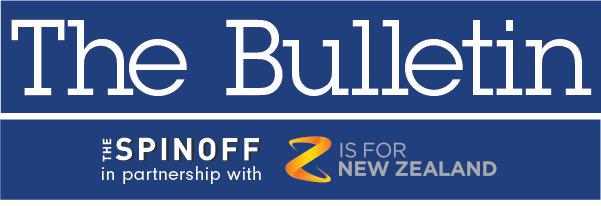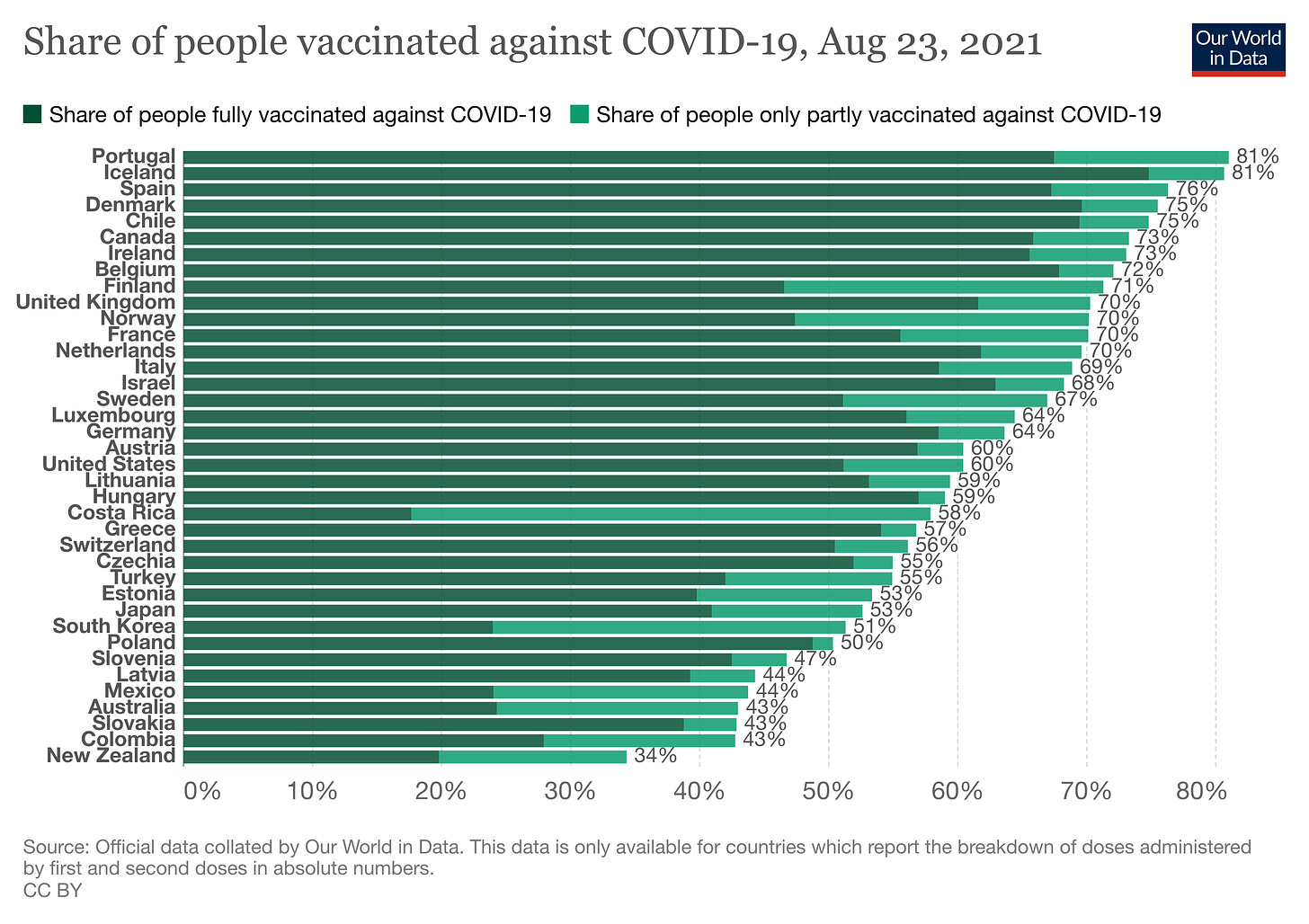Comparing NZ's vaccine rollout to the world
The country's effort to get out Covid-19 vaccines has been called everything from overachieving to a dismal failure. Neither are true. Here's a look at the numbers.
Good morning and welcome to The Bulletin for Thursday, August 26, by Justin Giovannetti. Presented in partnership with Z Energy
In today’s edition: A close look at New Zealand’s vaccination programme, a growing delta outbreak in Auckland and new mobility data from Google shows how much we are staying home and getting around this lockdown.
What’s the state of the country’s vaccine programme? (Getty Images)
There are two narratives around New Zealand’s Covid-19 vaccine rollout. According to the government, it's a solid plan that remains ahead of schedule and will provide everyone with an opportunity to get at least one jab before the year is done. According to the opposition, missed opportunities and poor decisions have led to a botched vaccination programme and the Covid-19 minister should resign.
The reality is probably somewhere between the two. As of yesterday, 2.9 million doses of the Pfizer vaccine have been administered in New Zealand. The country’s 4 million adults and teenagers will eventually need at least 8 million doses. In the past week the programme has broken daily records, with a high of 80,000 people vaccinated yesterday. Just over 1 million people are now fully vaccinated, or about 21% of the population. About another 16% of the population has had one jab.
That’s really not great. New Zealand’s vaccine programme has slowly gained steam since it started in mid-February but within the OECD, a club of 38 generally high-income democracies, we’re in last place based on the percentage of the population that has received a vaccination. Second-to-last is Colombia.
New Zealand is not last in the world. We are getting closer to the middle of the pack as some programmes slow down or falter. Unfortunately, a number of African, South American and Asian countries barely have a vaccination programme at all.
Details on the vaccination drives in every OECD country on Monday.
The details of the government’s agreement with Pfizer aren’t public. I’ve been writing about the government’s vaccine programme since it began and there’s a tremendous amount of wishful thinking online. Some have argued on social media that the slow programme is a good sign, because it necessarily means doses are going to developing countries that need them more. There’s very little evidence that is happening. Supporters of the government’s vaccine programme are adamant that the country is getting its assigned allocation from Pfizer. No such thing exists. The vaccines are ordered from a pharmaceutical giant that is looking to maximise its profit. This is not a humanitarian venture.
I wish I could tell you more about the country’s dealings with Pfizer, like how much was paid per dose and when they were purchased, as well as upcoming delivery schedules. Other countries have shared that information or it's been leaked to local media. New Zealand’s government has maintained that its conversations with Pfizer are protected by “commercial confidentiality” and exempt from official information requests and most parliamentary scrutiny. The only real information that exists is jabs in arms.
Could New Zealand’s programme have been faster? Possibly, but the government had to meet the public’s expectations for safety, according to Graham Le Gros. He’s the director of the Malaghan Institute of medical research and is one of the country's top immunologists. “If you cast your mind back, everyone wanted to be assured that it was safe. People wanted to see if it was safe overseas and it would have been hard for the government to move very early before it had those assurances,” he told The Bulletin.
“With the power of time, people might wish that we’d purchased the vaccine earlier or paid more earlier. But that’s not what happened. We may have been fooled into thinking that we could keep the virus away with border controls and other measures. What we’ve learned in recent months is that delta has evolved to the point that it can break through and get around. I wouldn’t want to say that we’ve been caught with our pants down, but we were caught with our pants down,” he said.
There are valid reasons we didn’t go early. According to Le Gros, New Zealand’s small population just didn’t make it an attractive buyer compared to countries like the US and UK that might have been willing to spend more per dose on much larger orders. “A vaccine company would rather make a big order, multi millions, rather than small countries like New Zealand. We were at the bottom of the queue, really,” said Le Gros.
The next chapter is really on us. His final piece of advice is to not get caught up on past decisions and to instead focus on the future. Yes the programme was slow, but doses are now coming in quickly and everyone over 30 can get a jab. By next week, everyone over the age of 12 will be eligible. “We need to now get the vaccine into as many people as possible. That’s the goal, that’s it,” he said.
New Zealand can still be the first country in the OECD to really aim for 100% coverage. Not 70% or 80%, but everyone. That has little to do with the name of the government in power or the minister signing the cheques, that’s up to us.
The Spinoff is doing our utmost to keep you updated on Covid-19 related news through this outbreak. Every dollar our members contribute directly funds our editorial team and is devoted to ensuring we do more. Click here to learn how you can support the team today.
The delta outbreak is now the biggest cluster since Covid first hit. The bad news is that 62 more cases were detected yesterday, bringing the total to 210 in the current outbreak. Early modelling had expected about 50 to 100 cases were present before lockdown. The good news is that the increase in case numbers isn’t exponential yet. That would only happen if infections started happening under lockdown and there’s no evidence of that. There are now 11 people in hospital because of the outbreak, none in ICU. RNZ has a wrap up of the day, including Ashley Bloomfield calling racists “frankly gutless.”
Jab approval for children not likely before end of year. Pfizer and Moderna, makers of different Covid-19 vaccines, are collecting trial data on kids in the US from ages 5 to 11, and there are still a number of unanswered question according to NPR, like whether small children need smaller doses. The American drug regulator could give emergency authorisation for the Pfizer jab for children by the end of the year. Earlier this week, the FDA finally granted full approval for its use in adults.
Police investigating anti-vax pamphlets. The NZ Herald reports police around Wellington say it appears that dropping misinformation in letterboxes around the capital could violate the “essential personal travel” limits of lockdown. Millions of people around the country have received the slick Voices for Freedom pamphlets which contain a significant amount of claims that just aren't remotely true. The group itself has told volunteers that dropping off pamphlets is a kind of recreation that it says is allowed under level four lockdown.
New Zealand's lockdown isn't as tight this time: data. Michael Andrew looks at new mobility data from Google and finds that the drop in traffic isn't as intense this level four as it was in 2020. While workplaces and public transit are way down again, with supermarkets slightly more popular this time, there is one big difference that jumps off the page and that's in the capital.
Got some feedback about The Bulletin, or anything in the news?
Get in touch with me at thebulletin@thespinoff.co.nz
Look no further than Old Friends Dog Game if you want to save some doggos. (Tina Tiller)
Right now on The Spinoff: Sam Brooks looks at an unusual collaboration that has become the year’s most wholesome game. Justin Latif has an important story on Watercare's decision not to consider climate change in its long-term modelling, leaving Auckland's mayor flummoxed. Duncan Greive figures that with the border staying shut for some time, maybe we should just sort the country out. Siouxsie Wiles tackles the question of vaccine boosters and everything we know about them. The Spinoff reports on the Midwifery Council ordering its members to cut out anti-vaxx rhetoric after a number told women not to get the jab. The official advice is that pregnant women are a priority for vaccinations in group three.
For a feature today, how someone becomes an overstayer in New Zealand. BusinessDesk has a sensitively reported story that is likely to confound many perceptions of who overstayers are and how they happen. At the centre is a man who has been in New Zealand since 2001. He arrived on a scholarship, got a job and raised a family. Then his visa ran out, but to support his family he just kept working. Here’s a sample:
“I'll be honest, when I lost my job in 2016, that's when I realised that I'm not from here.” Then the struggle began. With 13 years of experience under his belt he thought he would be OK. After all, there were dozens of similar roles being advertised every week, but, as he puts it: “I failed at the last hurdle” when employers asked to see his passport. For the next four years, the family scraped by.
The Auckland team based out of Brisbane. With the rugby league season set to kick off in about three months, the NZ Herald (paywalled) reports that the Warriors are looking at setting up camp in a Brisbane suburb. The team would need a trans-Tasman bubble to head back to Auckland permanently and that is very unlikely. Instead, the Warriors have spent the last two seasons playing from temporary facilities and council grounds in Australia. It’s an unusual solution to an unusual time.
That's it for The Bulletin. If you want to support the work we do at The Spinoff, please check out our membership programme.








